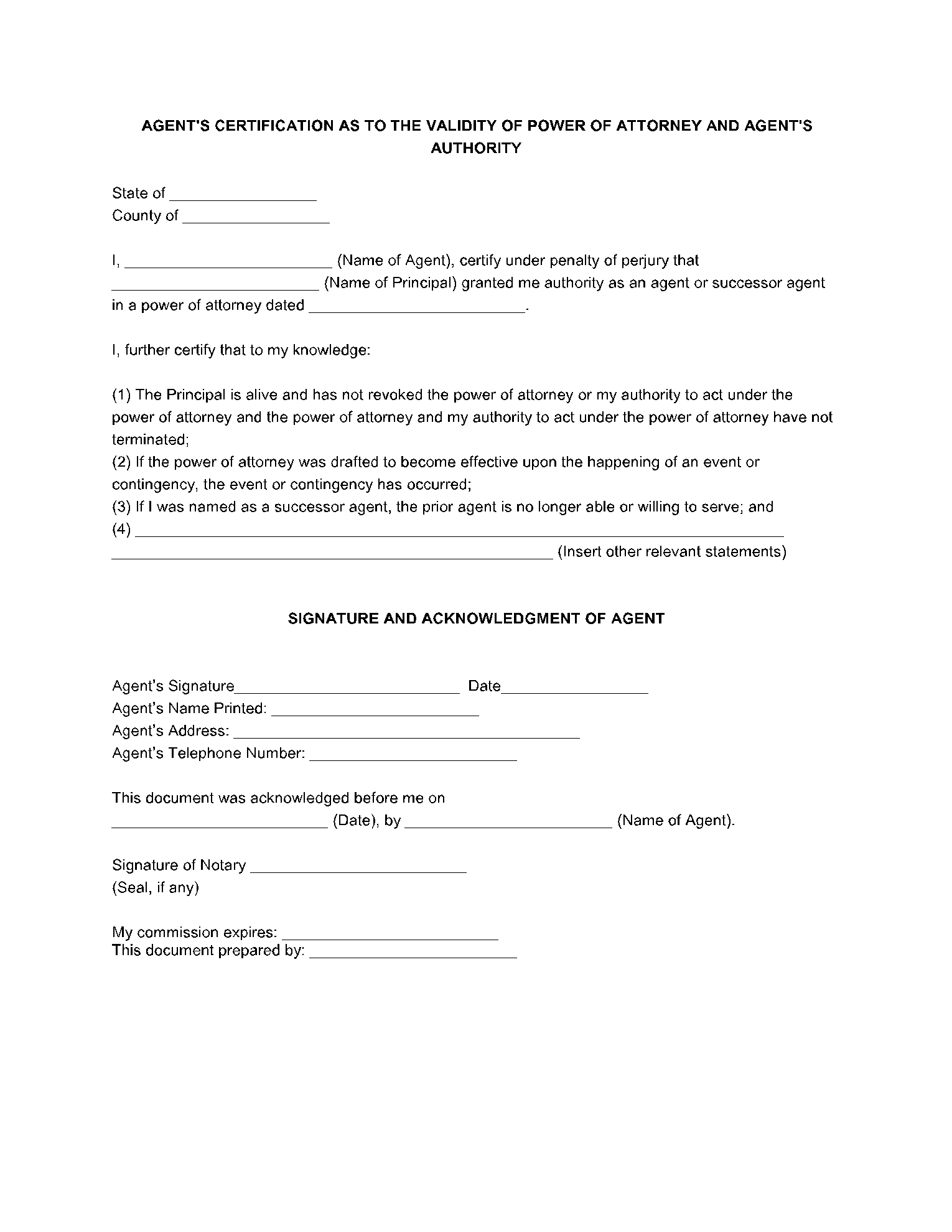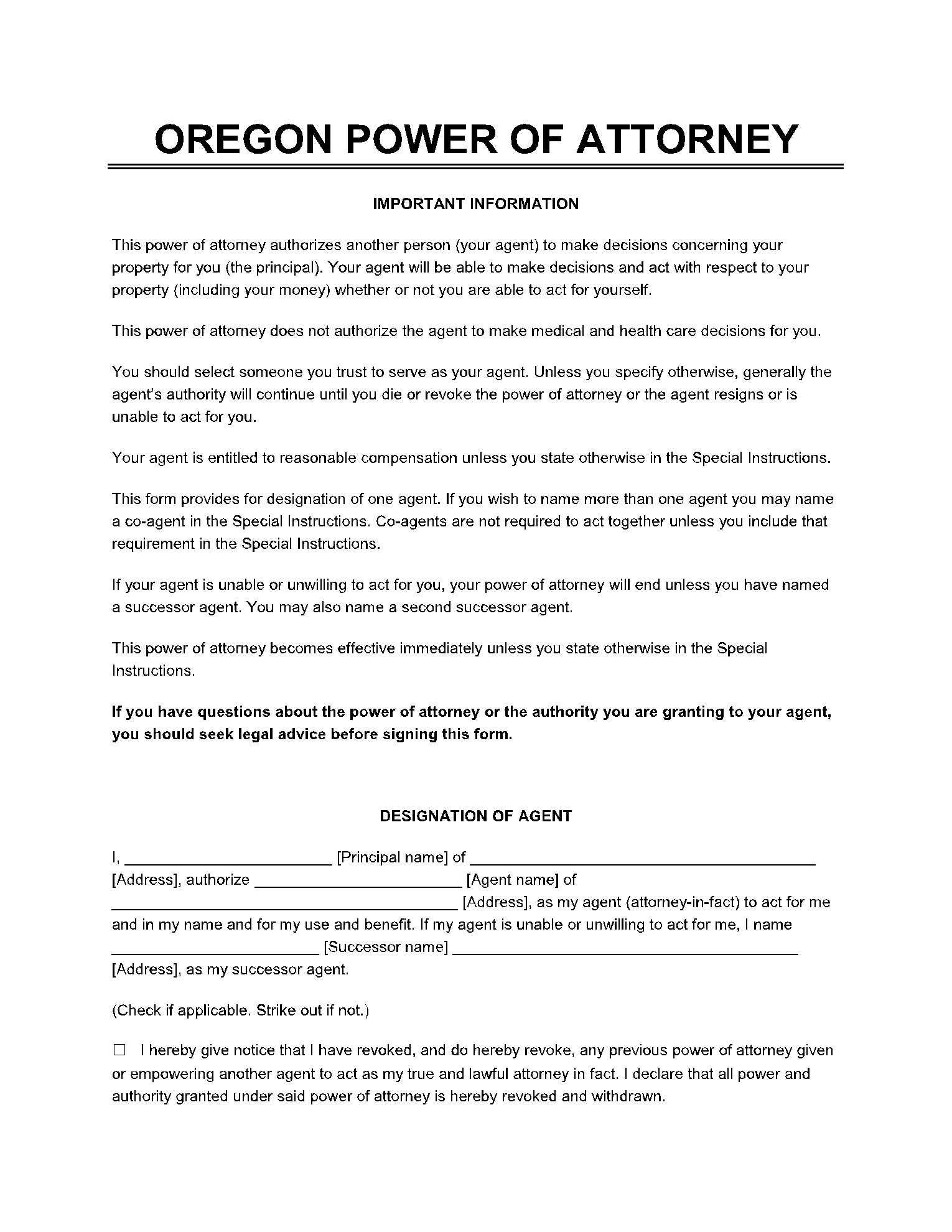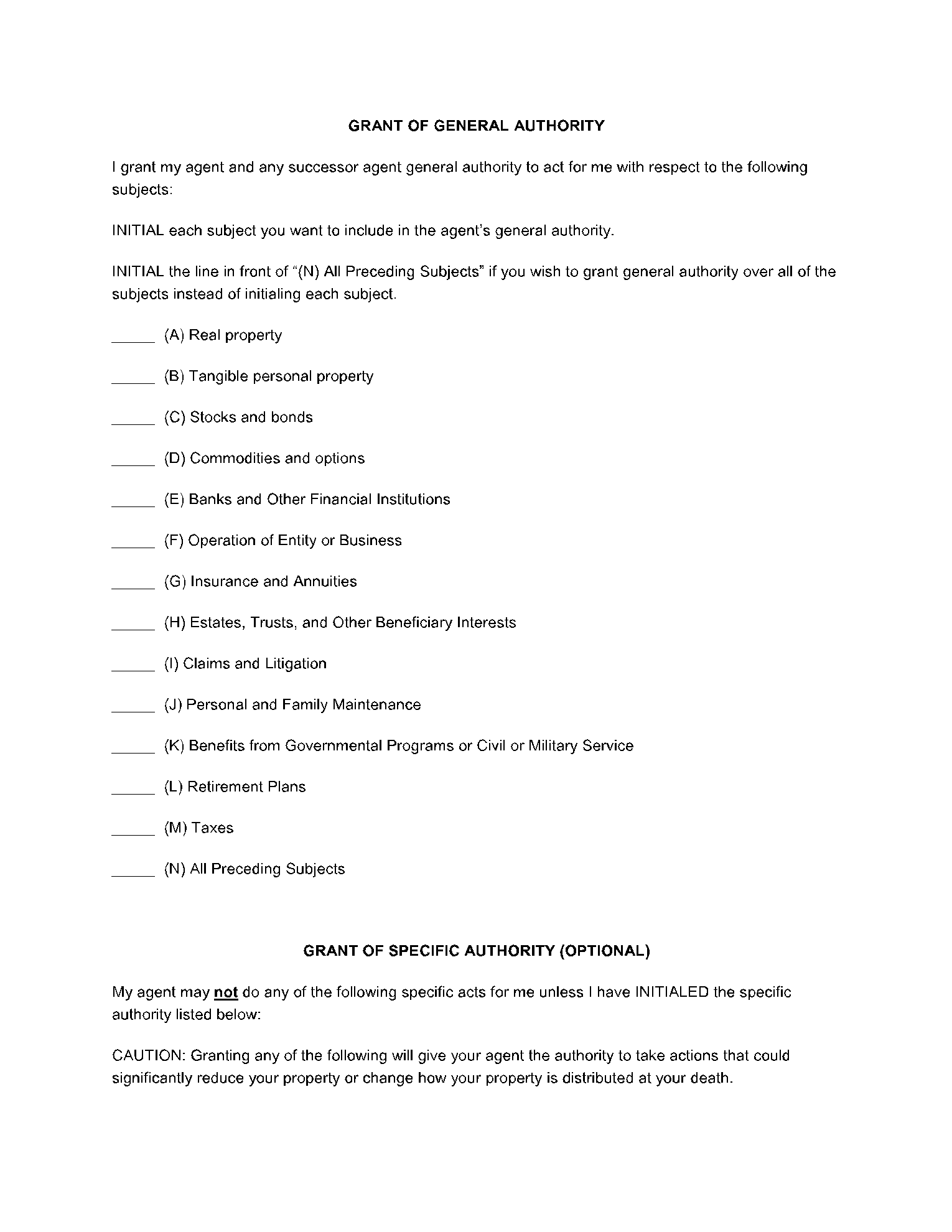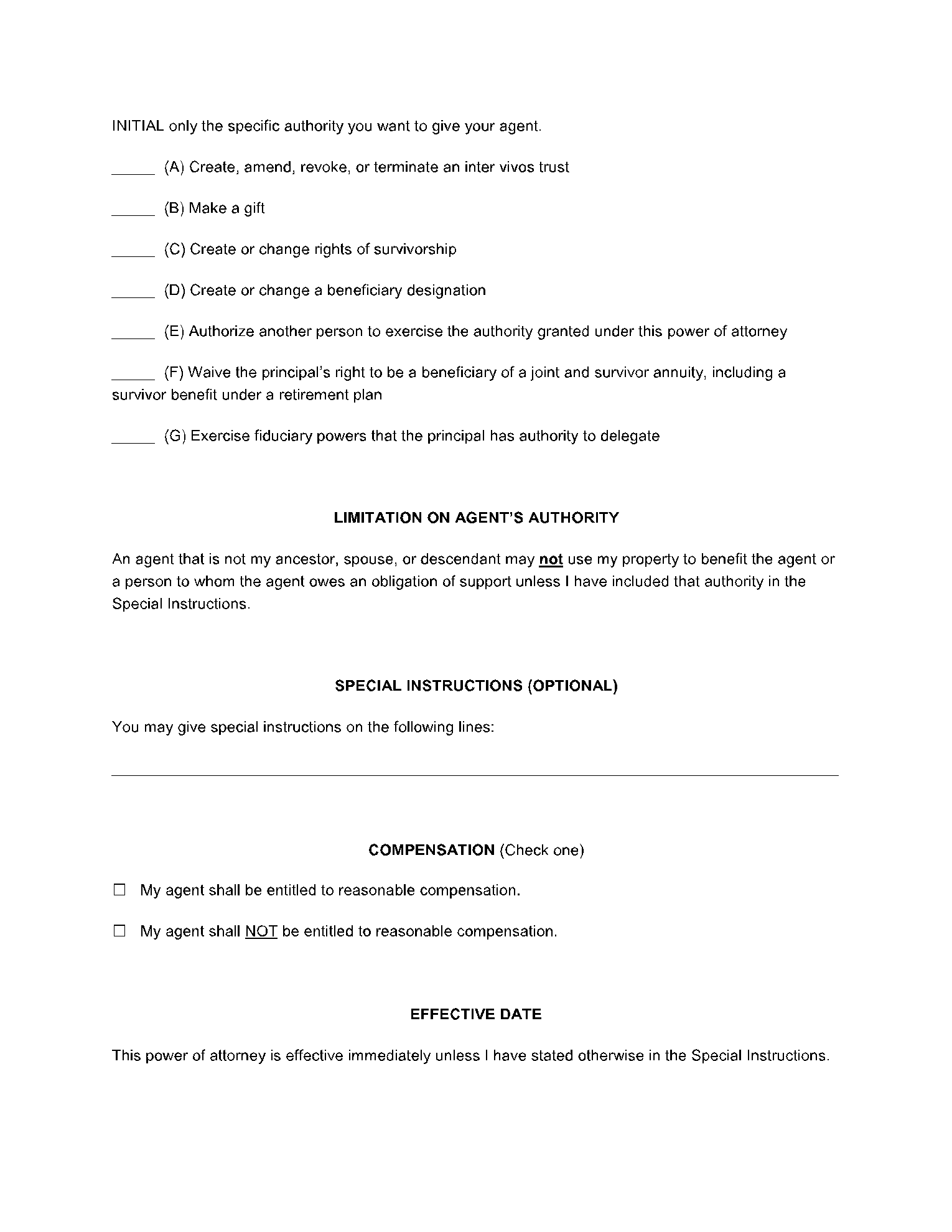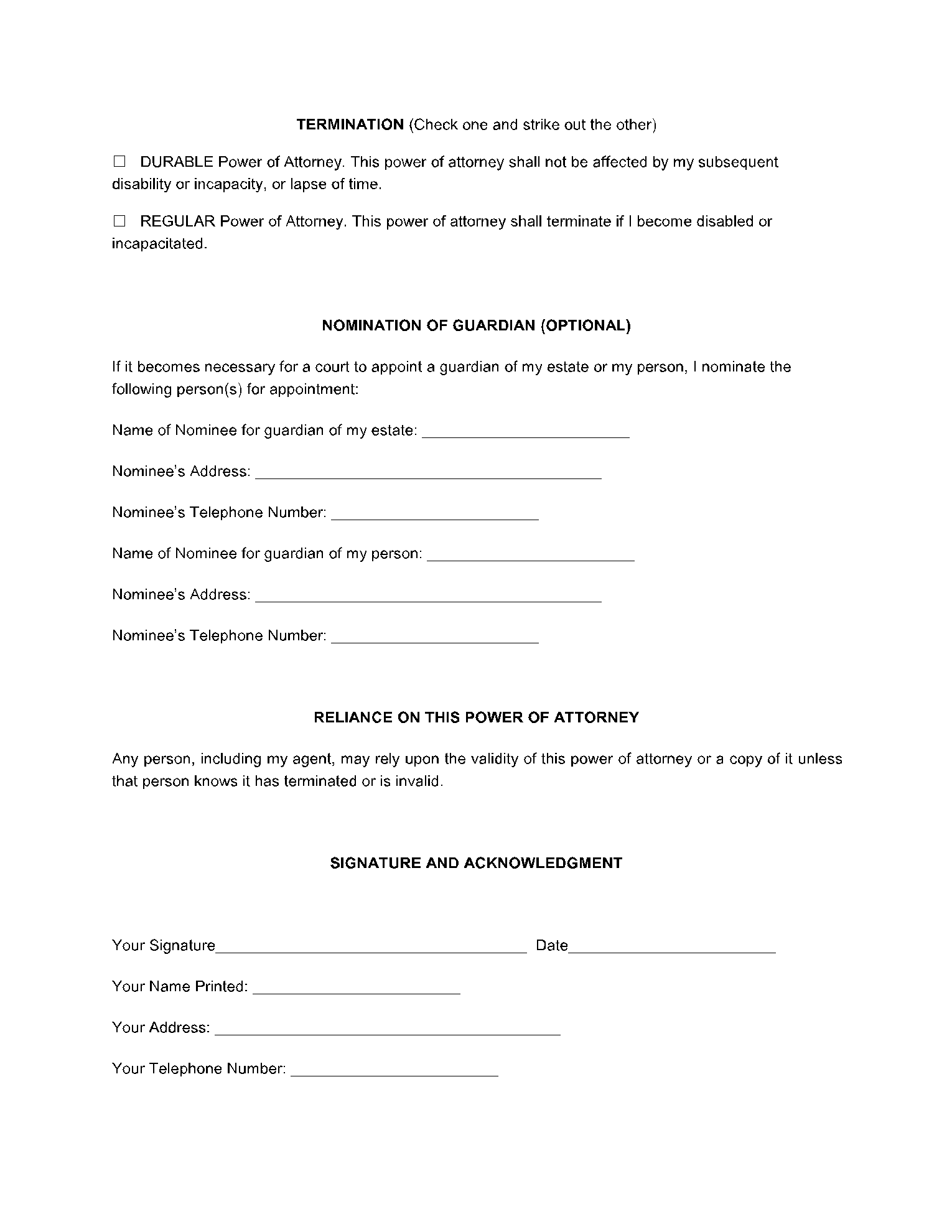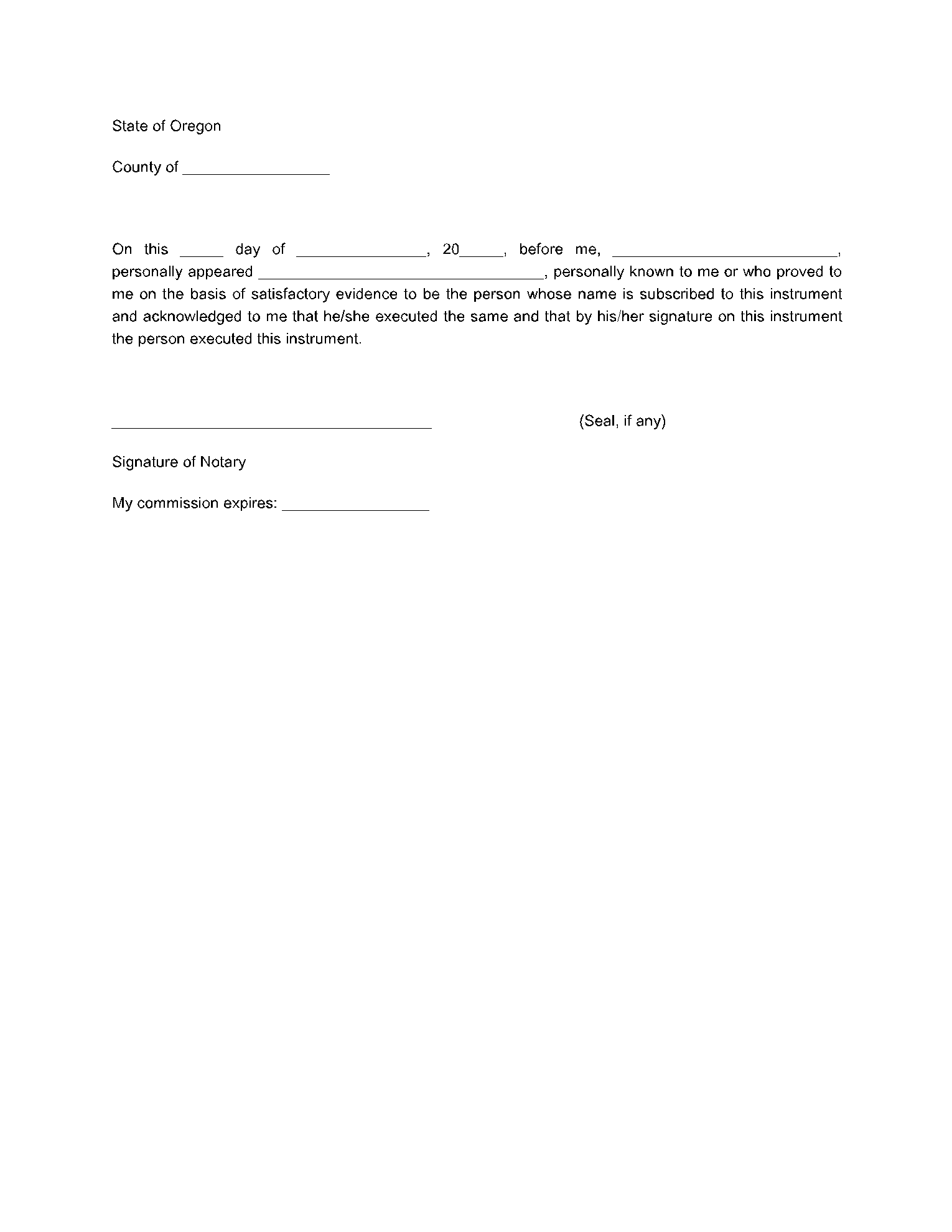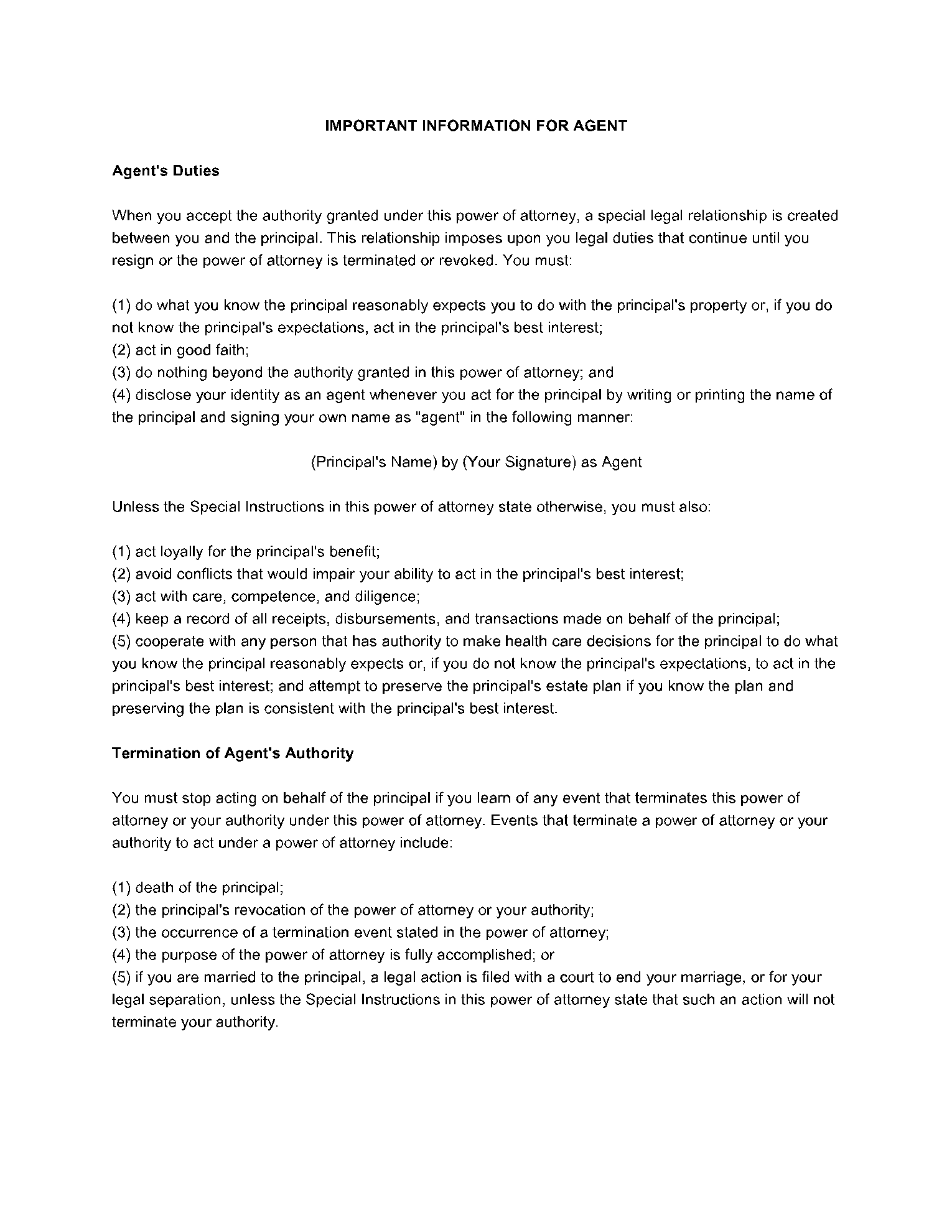An Oregon power of attorney document is a legal instrument that grants individuals the powers to appoint someone to stand in for them when they are unavailable or incapacitated to make certain decisions for themselves. Regardless of the type, this power of attorney is usually revoked immediately upon the demise of the principal.
The agent is bound by the dictates of this legal document to represent the principal’s best interests. This article reveals a lot more about an Oregon power of attorney.
This Oregon power of attorney template must includes the following information:
-
- Title of form
- Date when the form was signed
- Contact information of all signatories to the form
- Signatures of principal and agent(s)
- Special instructions highlighting specific powers granted to the agent, as well as limitations of such powers
- Name and contact information of alternate agents, if any.
What Is an Oregon Power of Attorney?
The laws governing the power of attorney Oregon are contained in Chapter 127 of the Oregon Revised Statutes. In some cases, the principal may stipulate that the proxy, or attorney-in-fact assumes control over the principal’s financial, legal or medical matters beyond the point where he’s incapacitated or disabled in any way (durable power of attorney).
Some other times, the powers of the agent are revoked as soon as the principal no longer has a sound sense of judgment or becomes physically incapacitated (durable power of attorney). Other types of power of attorney Oregon are medical power of attorney and springing power of attorney.
Unless given an ending date, the laws of the state assume that the Oregon power of attorney is durable. Most often than not, the powers of the agent become effective immediately the power of attorney form Oregon is signed in accordance with the provisions of the law.
After signing the Oregon power of attorney template, make your experience less intimidating.
Download power of attorney form Oregon template and delegate authority to someone to act in your name on various matters when you are absent or incapable.
Get your free copy of the template by clicking below.
What to Include in an Oregon Power of Attorney?
All Oregon power of attorney forms must contain the following:
- Title of form
- Date when the form was signed
- Contact information of all signatories to the form
- Signatures of principal and agent(s)
- Special instructions highlighting specific powers granted to the agent, as well as limitations of such powers
- Name and contact information of alternate agents, if any.
Why It Is Important to Use The Oregon Power of Attorney?
People should consider signing an Oregon power of attorney document if they:
- wish to give someone broad authorization to act in their name on several matters whenever they are absent or are incapable.
- need someone to represent them on particular matters they have no professional knowledge about, say tax-related or real estate transactions
- work in a high-risk environment
- are travelling out of the country for a while and need someone to make medical decisions for a dependent who is a minor
- are prone to medical illnesses like dementia or Alzheimer’s.
Oregon Power of Attorney Requirements
There are no particular laws about signing in Oregon other than that the signing be acknowledged by a notary public. According to the dictates of the law, an Oregon power of attorney form does not become valid unless signed in the presence of a notary public or signed by at least two witnesses. These witnesses must also have attained the legal age of 18 years old.
In the case of a durable power of attorney, a principal is not regarded as incapacitated unless otherwise proven by a certified physician. This medical professional should state verbally that the principal can no longer make decisions on his/her own.
Chapter 127 of Oregon Laws explicitly states that:
- The power of attorney becomes effective upon signing and remains valid till it is revoked by the principal
- The agent’s powers remain valid even after the principal is declared financially incapable; and
- The agent’s powers remain unaffected by the passage of time.
By being unaffected by the passage of time, the law recognizes the validity of the agent’s powers regardless of how long ago the document was created. In other words, a bank, for example, cannot refuse an agent the rights to act in the name of the principal because the document was created some forty years ago.
After signing the Oregon power of attorney template, make your experience less intimidating.
Download power of attorney form Oregon template and delegate authority to someone to act in your name on various matters when you are absent or incapable.
Get your free copy of the template by clicking below.
FAQs
-
How to revoke power of attorney in Oregon?</
A principal can revoke a power of attorney anytime deemed fit. This revocation becomes effective once the principals:
- Authorize a new durable power of attorney form; or
- Authorize a power of attorney revocation form
-
How to obtain a power of attorney?
A principal may obtain a power of attorney from an Oregon Bar or from an online website. A reputable platform like CocoSign for example offers several power of attorney forms for Oregon one can choose from.
Regardless of the source, once the form reflects all the thoughts of the principal and is executed according to the provisions of the law, it is considered effective.
There are so many power of attorney forms online these days. But how many of them are in correspondence with Oregon Revised Statutes. On CocoSign, you not only find forms created in accordance with the laws of the state, but those with provisions for the peculiar needs of the principal.
DOCUMENT PREVIEW
- To receive and deposit funds in any financial institution, and to withdraw funds by check or otherwise to pay for goods, services, and any other personal and business expenses for my benefit. If necessary to effect my attorney-in-fact’s powers, my attorney-in-fact is authorized to execute any document required to be signed by such banking institution.
________ SAFE DEPOSIT BOX - To have access at any time or times to any safe-deposit box rented by me or to which I may have access, wheresoever located, including drilling, if necessary, and to remove all or any part of the contents thereof, and to surrender or relinquish said safe-deposit box; and any institution in which any such safe-deposit box may be located shall not incur any liability to me or my estate as a result of permitting my attorney-in-fact to exercise this power.
________ LENDING OR BORROWING - To make loans in my name; to borrow money in my name, individually or jointly with others; to give promissory notes or other obligations therefor; and to deposit or mortgage as collateral or for security for the payment thereof any or all of my securities, real estate, personal property, or other property of whatever nature and wherever situated, held by me personally or in trust for my benefit.
________ GOVERNMENT BENEFITS - To apply for and receive any government benefits for which I may be eligible or become eligible, including but not limited to, Social Security, Medicare and Medicaid.
________ RETIREMENT PLAN - To contribute to, select payment option of, roll-over, and receive benefits of any retirement plan or IRA I may own, except my attorney-in-fact shall not have power to change the beneficiary of any of my retirement plans or IRAs.
________ TAXES - To complete and sign any local, state and federal tax returns on my behalf, pay any taxes and assessments due and receive credits and refunds owed to me and to sign any tax agency documents necessary to effectuate these powers.
________ INSURANCE - To purchase, pay premiums and make claims on life, health, automobile and homeowners' insurance on my behalf, except my attorney-in-fact shall not have the power to cash in or change the beneficiary of any life insurance policy.
________ REAL ESTATE
- To acquire, purchase, exchange, lease, grant options to sell, and sell and convey real property, or any interests therein, on such terms and conditions, including credit arrangements, as my attorney-in-fact shall deem proper; to execute, acknowledge and deliver, under seal or otherwise, any and all assignments, transfers, deeds, papers, documents or instruments which my attorney-in-fact shall deem necessary in connection therewith.
________ PERSONAL PROPERTY - To acquire, purchase, exchange, lease, grant options to sell, and sell and convey personal property, or any interests therein, on such terms and conditions, including credit arrangements, as my attorney-in-fact shall deem proper; to execute, acknowledge and deliver, under seal or otherwise, any and all assignments, transfers, titles, papers, documents or instruments which my attorney-in-fact shall deem necessary in connection therewith; to purchase, sell or otherwise dispose of, assign, transfer and convey shares of stock, bonds, securities and other personal property now or hereafter belonging to me, whether standing in my name or otherwise, and wherever situated.
________ POWER TO MANAGE PROPERTY- To maintain, repair, improve, invest, manage, insure, rent, lease, encumber, and in any manner deal with any real or personal property, tangible or intangible, or any interests therein, that I now own or may hereafter acquire, in my name and for my benefit, upon such terms and conditions as my attorney-in-fact shall deem proper.
________ GIFTS - To make gifts, grants, or other transfers (including the forgiveness of indebtedness and the completion of any charitable pledges I may have made) without consideration, either outright or in trust to such person(s) (including my attorney-in-fact hereunder) or organizations as my attorney-in-fact shall select, including, without limitation, the following actions: (a) transfer by gift in advancement of a bequest or devise to beneficiaries under my will or in the absence of a will to my spouse and descendants in whatever degree; and (b) release of any life interest, or waiver, renunciation, disclaimer, or declination of any gift to me by will, deed, or trust
________ LEGAL ADVICE AND PROCEEDINGS - To obtain and pay for legal advice, to initiate or defend legal and administrative proceedings on my behalf, including actions against third parties who refuse, without cause, to honor this instrument.
SPECIAL INSTRUCTIONS: On the following lines are any special instructions limiting or extending the powers I give to my attorney-in-fact (Write “None” if no additional instructions are given):
______________________________________________________________________
______________________________________________________________________
______________________________________________________________________
